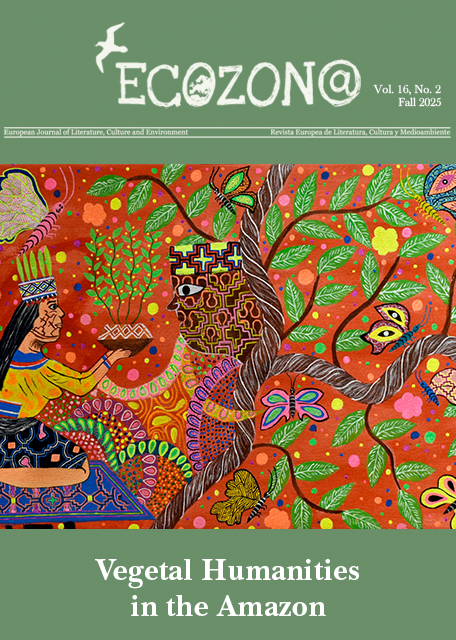Climate Fiction and the Ethics of Existentialism
An Econarratological Analysis of Lyra Koli's Allting Växer
DOI:
https://doi.org/10.37536/ECOZONA.2021.12.1.3826Schlagworte:
Allting Växer, climate fiction, econarratology, existentialism, ecocriticismAbstract
The purpose of this article is twofold: Existentialism as a philosophical discipline and ethical reference point seems to be a rare guest in ecocriticism. Based on an analysis of Lyra Koli's climate fiction Allting Växer (2018) this article argues that existentialism has something to offer to the ecocritical field. I make use of an econarratological approach, drawing on James Phelan's narrative ethics. Thus, I emphasize the article's second purpose, as narrative ethics is about reconstructing narratives own ethical standards rather than the reader bringing a prefabricated ethical system to the narrative. This reading practice can help to question the idea that some ethical and philosophical standards are better than others within ecocriticism—by encouraging scholars in ecocriticism to relate to what existentialism has to do with climate change in this specific case. In continuation of my analysis, I argue that Allting Växer is pointing at a positive side of existentialist concepts such as anxiety or anguish, that is, that there is a reflecting and changing potential in these moods or experiences. This existentialist framework contrasts with the interpretation of "Anthropocene disorder" (Timothy Clark) as the only outcome when confronting the complexity of the Anthropocene.
Downloads
Downloads
Veröffentlicht
Ausgabe
Rubrik
Lizenz
Authors who publish with this journal agree to the following terms:
a) Authors retain copyright and grant the journal right of first publication with the work simultaneously licensed under a Creative Commons Attribution License that allows others to share the work with an acknowledgement of the work's authorship and initial publication in this journal (CC BY-NC for articles and CC BY-NC-ND for creative work, unless author requests otherwise.
b) Authors are able to enter into separate, additional contractual arrangements for the non-exclusive distribution of the journal's published version of the work (e.g., post it to an institutional repository or publish it in a book), with an acknowledgement of its initial publication in this journal.
c) Authors are permitted and encouraged to post their work online (e.g., in institutional repositories or on their website) prior to and during the submission process, as it can lead to productive exchanges, as well as earlier and greater citation of published work (See The Effect of Open Access).










